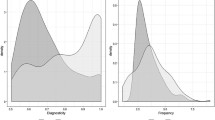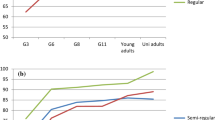Abstract
Recent studies have shown that many subject-verb agreement errors consist of making the verb agree with the immediately preceding noun, as in “The smell of the rubbish-bins are foul”. Assuming that it is the automaticity of the agreement operation which is responsible for these attraction errors in expert writers, the present studies aimed at demonstrating the gradual automatization of this operation in young writers by examining developmental changes in the occurrence of agreement errors. In three experiments we found that subjects' performance moves from systematic errors in number agreement in young children (e.g., no use of plural marks) to attraction errors in fifth graders and older adults through an intermediate phase characterized by an attention-demanding and easily disrupted computation of verb agreement displayed by some second graders. Attraction errors are a byproduct of the automatization of the implementation of the agreement process.
Similar content being viewed by others
References
Alegria, J. & Mousty, P. (1994). On the development of lexical and non-lexical spelling procedures of French-speaking, normal and disabled children. In: G. D. A. Brown & N. C. Ellis (eds.), Handbook of spelling (pp. 211–226). Chichester, UK: John Wiley & Sons.
Anderson, J. R. (1983). The Architecture of cognition. New York: Academic Press.
Anderson, J. R. (1992). Automaticity and the ACT theory, American Journal of Psychology 105: 165–180.
Anderson, J. R. (1993). Rules of the mind. Hillsdale, N.J.: Laurence Erlbaum.
Baddeley, A. D. (1986). Working memory. Oxford: Clarendon Press.
Beers, C. S. & Beers, J. W. (1992). Children's spelling of English inflectional morphology. In: S. Templeton & D. R. Bear (eds.), Development of orthographic knowledge and the foundations of literacy (pp. 231–251). Hillsdale, NJ: LEA.
Berko, J. (1958). The child's learning of English morphology, Word 14: 150–177.
Bock, J. K. (1995). Producing agreement, Current Directions in Psychological Science 4: 56–61.
Bock, J. K. & Cutting, J. C. (1992). Regulating mental energy: Performance units in language production, Journal of Memory and Language 31: 99–127.
Bock, J. K. & Eberhard, K. M. (1993). Meaning, sound, and syntax in English number agreement, Language and Cognitive Processes 8: 57–99.
Bock, J. K. & Miller, C. A. (1991). Broken agreement, Cognitive Psychology 23: 45–93.
Brown, R. (1973). A first language: The early stages. Cambridge, MA: Harvard University Press.
Catach, N. (1986). L'orthographe française (French orthography). Paris: Nathan.
Cazden, C. B. (1968). The acquisition of noun and verb inflections, Child development 39: 433–448.
Chanquoy, L. & Negro, I. (1996). Subject-verb agreement errors in written productions. Study in French children and adults, Journal of Psycholinguistic Research 25: 553–570.
Conrad, R. (1964). Acoustic confusion in short-term memory, British Journal of Psychology 55: 75–84.
Corbeil, J. C. (1968). FrLes structures syntaxiques du Français moderne (Syntactic structures of modern French). Paris: Klincksieck. de Villiers, J. G. & de Villiers, P. A. (1973). A cross-sectional study of the acquisition of grammatical morphemes, Journal of Psycholinguistic Research 2: 267–278.
Dubois, J. (1965). Grammaire structurale du Français (Structural grammar of French language). Paris: Larousse.
Fayol, M. & Got, C. (1991). Automatisme et controle dans la production ecrite: Les erreurs d'accord sujet-verbe chez l'enfant et l'adulte (Automatism and control in written production: Subject-verb agreement errors in children and adults), L'Annee Psychologique (The Psychological Quarterly) 91: 187–205.
Fayol, M., Largy, P. & Lemaire, P. (1994). When cognitive overload enhances subjectverb agreement errors: A study in French written language, The Quarterly Journal of Experimental Psychology 47A: 437–464.
Gak, V. G. (1976). L'orthographe française (French orthography). Paris: SELAF.
Gelman, R. & Gallistel, C. R. (1978). The child's understanding of number. Cambridge, MA: Harvard University Press.
Girolami-Boulimier, A. (1984). Les niveaux actuels dans la pratique du langage oral et ecrit (Current performance in oral and written French language). Paris: Masson.
Hupet, M., Fayol, M. & Schelstraete, M. A. (1998). Effects of semantic variables on the subject-verb agreement processes in writing, British Journal of Psychology, 89, 59–75.
Hupet, M., Schelstraete, M. A., Demaeght, N. & Fayol, M. (1996). Les erreurs d'accord sujetverbe en production écrite (Subject-verb agreement errors in written production), L'Année Psychologique (The Psychological Quarterly) 96: 587–610.
Jaffre, J. P. (1992). Didactiques de l'orthographe (The teaching of spelling). Paris: Hachette.
Jarema, G. & Kehayia, E. (1992). Impairment of inflectional morphology and lexical storage, Brain and Language 43: 541–564.
Keeney, T. J. & Wolfe, J. (1972). The acquisition of agreement in English, Journal of Verbal Learning and Verbal Behavior 11: 698–705.
Klapp, S. T., Boches, C. A., Trabert, M. L. & Logan, G. L. (1991). Automatizing alphabet arithmetic: II. Are there practice effects after automaticity is achieved?, Journal of Experimental Psychology: Learning, Memory, and Cognition 17: 196–209.
Kreiner, D. S. & Gough, P. B. (1990). Two ideas about spelling: Rules and word-specific memory. Journal of Memory and Language 29: 103–118.
Largy, P., Fayol, M. & Lemaire, P. (1996). The homophone effect in written French: The case of verb/noun inflection errors, Language and Cognitive Processes 11: 217–255.
Logan, G. D. (1988a). Toward an instance theory of automatization, Psychological Review 95: 492–527.
Logan, G. D. (1988b). Automaticity, resources, and memory, Human Factors 30: 583–598.
Logan, G. D. & Klapp, S. T. (1991). Automatizing alphabet arithmetic: Is extended practice necessary to produce automaticity?, Journal of Experimental Psychology: Learning, Memory, and Cognition 17: 179–195.
Mervis, C. B. & Johnson, K. E. (1991). Acquisition of the plural morpheme: A case study, Developmental Psychology 27: 222–235.
Nunes, T., Bryant, P. & Bindman, M. (1997). Spelling and grammar: The necsed move. In: C. Perfetti, L. Rieben & M. Fayol (eds.), Learning to spell (pp. 151–170). Mahwah, N.J.: Erlbaum.
Siegler, R. S. (1987). The peril of averaging data over strategies: An example from children's addition, Journal of Experimental Psychology: General 106: 250–264.
Starkey, P., Spelke, E. S. & Gelman, R. (1990). Numerical abstraction by human infants, Cognition 36: 97–127.
Ters, F., Mayer, G. & Reichenbach, D. (1988). L'échelle Dubois-Buyse (The Dubois-Buyse scale). Paris: Editions M.D.I.
Totereau, C., Fayol, M. & Barrouillet, P. (in press). Overgeneralizations of number inflections in the learning of written French: The case of nouns and verbs, British Journal of Developmental Psychology.
Totereau, C., Thevenin, M. G. & Fayol, M. (1997). The development of the understanding of number morphology in written French. In: C. Perfetti, L. Rieben & M. Fayol, M. (eds.), Learning to spell (pp. 97–114). Mahwah, N.J.: Erlbaum.
Vigliocco, G., Butterworth, B. & Semenza, C. (1996). Constructing subject-verb agreement in speech: The role of semantic and morphological factors. Journal of Memory and Language 34: 186–215.
Author information
Authors and Affiliations
Rights and permissions
About this article
Cite this article
Fayol, M., Hupet, M. & Largy, P. The acquisition of subject-verb agreement in written French: From novices to experts' errors. Reading and Writing 11, 153–174 (1999). https://doi.org/10.1023/A:1008038127807
Issue Date:
DOI: https://doi.org/10.1023/A:1008038127807




